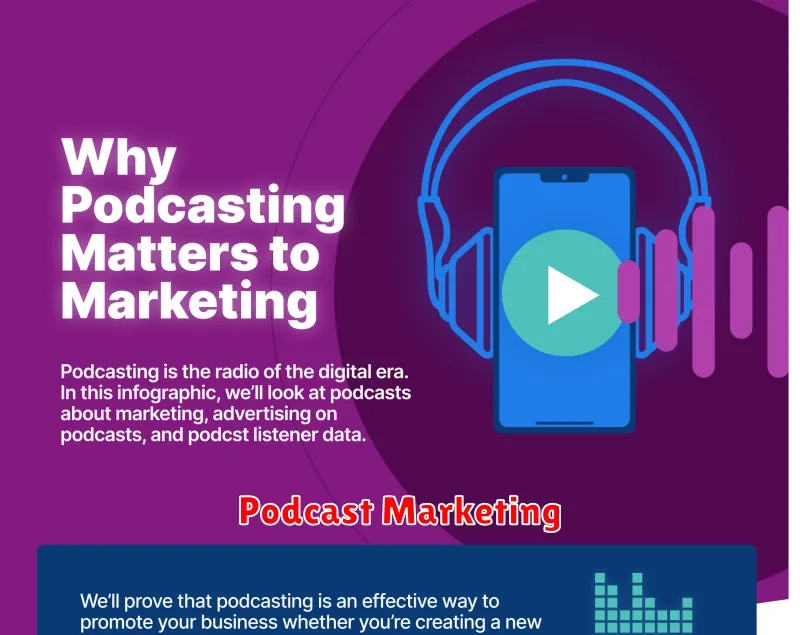Are you looking for a powerful and engaging way to reach your target audience and boost your ecommerce sales? Look no further than podcasting! In today’s digital landscape, where consumers are bombarded with information, podcasts provide a unique opportunity to connect with potential customers in a meaningful and impactful way. With a well-crafted podcast strategy, you can tap into a vast and growing audience, build brand awareness, and ultimately drive conversions.
This comprehensive guide will delve into the world of ecommerce podcasting, offering actionable insights and practical tips to help you unlock the true potential of this powerful marketing channel. From understanding the benefits of podcasting for ecommerce to crafting compelling content, promoting your podcast, and measuring success, this guide will equip you with the knowledge and tools you need to tune in to success.
Why Podcasts Are a Powerful Tool for Ecommerce Businesses
In today’s saturated digital landscape, it can be challenging for ecommerce businesses to stand out and reach their target audience. While traditional marketing strategies like social media and paid advertising still hold value, podcasts offer a unique and powerful channel to engage with potential customers and drive sales.
Podcasts are more than just audio entertainment; they provide a platform for building relationships, establishing expertise, and fostering trust with your audience. Here’s why podcasts are a must-have tool for ecommerce businesses:
1. Enhanced Brand Awareness and Reach: Podcasts allow you to reach a wider audience beyond your typical social media followers. By partnering with relevant podcasts or creating your own, you can tap into a loyal and engaged listener base who are actively seeking information and entertainment.
2. Increased Engagement and Trust: The intimate nature of podcasts fosters a deeper connection with your audience. Listening to your voice or that of your brand ambassadors creates a sense of trust and familiarity. This can lead to higher engagement rates and a more favorable perception of your brand.
3. Targeted Advertising and Promotion: Podcasts offer various advertising options, including pre-roll, mid-roll, and post-roll ads, allowing you to target specific demographics and interests. This targeted approach ensures that your message reaches the right audience and maximizes your return on investment.
4. Educational Content and Value-Adding: Podcasts provide a platform to share valuable information and insights related to your products or industry. By offering educational content, you establish yourself as a thought leader and demonstrate your expertise, building credibility and trust with your audience.
5. Direct Call to Action and Sales Conversion: Unlike other forms of content, podcasts offer a direct channel to drive sales. You can seamlessly incorporate calls to action within the episode, encouraging listeners to visit your website, browse your products, or make a purchase.
In conclusion, podcasts offer a unique and powerful tool for ecommerce businesses to enhance brand awareness, build trust, and drive sales. By leveraging the engaging nature of podcasts and strategically incorporating calls to action, you can create a compelling experience for your audience and achieve tangible business results.
Identifying Your Target Audience and Choosing the Right Podcasts
Before you even begin searching for podcasts to advertise on, you need to know who you’re trying to reach. Take some time to define your target audience. Consider their demographics, interests, and online habits. What kind of podcasts do they listen to?
Once you have a clear understanding of your target audience, you can start searching for podcasts that align with their interests. Use tools like Chartable and Listen Notes to search for podcasts based on category, keywords, and demographics. You can also look at the listenership data for podcasts to ensure that they have a significant audience that overlaps with your target market.
Look at the types of sponsorships that the podcast has run in the past. This can give you valuable insights into the type of brands that they work with, and whether they are a good fit for your brand. Ultimately, you want to choose podcasts that reach your target audience and that are a good fit for your brand’s message and values.
Crafting Engaging Podcast Content That Resonates with Listeners
Podcasts offer a unique platform to reach and engage your target audience. To make your podcast truly effective, you need to craft content that resonates with listeners. Here are some key strategies to keep in mind:
Know Your Audience: The foundation of engaging content lies in understanding your listeners. Research their demographics, interests, and pain points. What are their biggest challenges? What kind of information are they looking for? Once you have a clear picture of your audience, you can tailor your content to their needs and interests.
Tell Stories: Stories are powerful tools for connecting with listeners. Share anecdotes, case studies, and personal experiences related to your brand and products. Use storytelling to create a sense of connection and build trust with your audience.
Provide Value: Your podcast should offer something of value to your listeners. This could be in the form of education, entertainment, or inspiration. Provide practical tips, valuable insights, or insightful interviews that address your audience’s pain points and help them solve their problems.
Be Authentic and Conversational: Listeners appreciate authenticity. Don’t try to be someone you’re not. Speak in a natural, conversational tone. Be yourself and allow your personality to shine through. Authenticity will make your podcast more engaging and relatable.
Experiment with Formats: Podcasts come in many formats. Explore different approaches, such as interviews, roundtable discussions, solo monologues, or even storytelling. Experiment with different formats to find what works best for your brand and audience.
Use Sound Effects and Music: Sound effects and music can enhance the listening experience. Use them strategically to create a more immersive and engaging atmosphere. Background music can add a layer of professionalism and elevate the overall production quality.
Get Feedback and Optimize: Don’t be afraid to ask for feedback from your listeners. Encourage them to share their thoughts and suggestions. Use this feedback to refine your content and make it more relevant and engaging.
Effective Strategies for Podcast Advertising and Sponsorship
Podcasts have become a powerful tool for businesses to reach their target audience and drive sales. Podcast advertising and sponsorship offer unique opportunities to connect with engaged listeners, build brand awareness, and generate leads. To maximize your investment and achieve your marketing goals, it’s crucial to employ effective strategies.
Target the Right Audience: Choose podcasts that align with your target demographic and industry. Research podcast listenership data and consider factors like age, gender, interests, and location. This ensures your message reaches the right ears.
Select the Right Ad Format: Podcasts offer diverse ad formats, including pre-roll, mid-roll, post-roll, host-read ads, and sponsored segments. Evaluate each format based on your budget, message length, and desired impact. Host-read ads, for instance, can provide a more authentic and engaging experience.
Craft Compelling Ads: Your ad should be concise, memorable, and relevant to the podcast’s audience. Highlight your unique value proposition and offer a clear call to action. Consider using humor, storytelling, or personal anecdotes to make your ad stand out.
Partner with Influencers: Collaborating with relevant influencers or podcast hosts can significantly amplify your reach and credibility. These partnerships can involve co-creating content, sponsoring episodes, or running joint promotions. Choose influencers who resonate with your brand and target audience.
Track and Measure Results: Don’t rely solely on anecdotal evidence. Use tracking tools to measure the effectiveness of your podcast advertising and sponsorship. Monitor metrics like downloads, engagement rates, website traffic, and sales conversions to understand what’s working and optimize your campaigns.
By implementing these strategies, you can leverage the power of podcasts to connect with your target audience, build brand awareness, and drive sales. Remember to continuously monitor and adjust your approach based on data and insights to maximize your return on investment.
Leveraging Influencer Marketing Through Podcast Collaborations
Podcast collaborations are a powerful strategy for tapping into the influencer marketing landscape. Partnering with podcasters whose audience aligns with your target demographic allows you to reach new and engaged consumers. By sponsoring episodes, participating in interviews, or launching co-branded content, you can effectively amplify your brand message and drive traffic to your e-commerce store.
When selecting podcasters, consider their listener demographics, engagement rates, and overall brand alignment. Choose collaborators who have a genuine interest in your brand and products, and who can authentically incorporate your offerings into their content. This approach ensures that your message resonates with their audience, fostering trust and building brand credibility.
Leveraging podcast collaborations can be a highly effective way to build brand awareness, generate leads, and drive sales for your e-commerce business. By strategically partnering with influential podcasters, you can tap into their loyal and engaged audiences, ultimately expanding your reach and boosting your bottom line.
Measuring the Success of Your Ecommerce Podcast Marketing Campaigns
You’ve launched your ecommerce podcast, and you’re seeing some downloads. But how do you know if it’s actually driving sales? Measuring the success of your podcast marketing campaigns is crucial to ensuring you’re getting a return on your investment.
Here are some key metrics to track:
- Downloads and Listeners: Track your total downloads and unique listeners. This gives you a baseline understanding of your audience size. You can track this through your podcast hosting platform or analytics tools.
- Engagement: Look at metrics like average listen time, completion rate, and listener engagement. This will help you understand how engaged your audience is and if your content is resonating with them.
- Website Traffic: Measure how many listeners are visiting your website after hearing your podcast. This could be tracked using UTM codes, which are short snippets of text added to a URL to help you track traffic from specific sources.
- Sales and Conversions: This is the ultimate metric to track. You can use tools like Google Analytics to connect podcast listeners to sales on your website, or use unique discount codes to track specific podcast listeners.
Beyond these metrics, consider conducting listener surveys and gathering feedback to gain deeper insights into your audience’s preferences and needs. By analyzing your data and making informed decisions, you can optimize your podcast marketing campaigns to drive real business results.
Tips for Repurposing Podcast Content Across Other Marketing Channels
Your podcast is a goldmine of valuable content that can be repurposed across various marketing channels to reach a wider audience. By strategically adapting your podcast content, you can maximize its impact and drive more traffic, leads, and sales for your ecommerce business.
Here are some tips for repurposing podcast content:
- Create blog posts: Transcribe your podcast episodes and turn them into engaging blog posts. Highlight key takeaways, expand on specific points, and include relevant images or videos.
- Share excerpts on social media: Break down your podcast episodes into bite-sized snippets and share them on social media platforms like Twitter, Facebook, and Instagram. Include a call to action, encouraging viewers to listen to the full episode.
- Develop video content: Create short video clips featuring highlights from your podcast, including quotes, soundbites, or visuals. Share these videos on YouTube, Vimeo, and other video platforms.
- Use quotes in email marketing: Incorporate memorable quotes or key takeaways from your podcast episodes into your email marketing campaigns. This can add personality and value to your emails.
- Create downloadable resources: Offer valuable resources based on your podcast content, such as ebooks, guides, or checklists. These resources can be promoted on your website, social media, and email list.
- Host webinars or online events: Repurpose your podcast content as a foundation for interactive webinars or online events. You can invite guest speakers, engage with your audience in real-time, and generate leads.
By repurposing your podcast content across other marketing channels, you can amplify its reach, create valuable content for your audience, and generate more leads for your ecommerce business.
Case Studies: Ecommerce Businesses That Nailed Podcast Promotion
Podcast promotion is an excellent strategy for ecommerce businesses seeking to expand their reach and drive sales. By leveraging the power of audio content, you can connect with your target audience on a deeper level, build trust and credibility, and ultimately convert listeners into loyal customers.
To inspire your own podcast marketing strategy, let’s look at some successful case studies of ecommerce businesses that have used podcasts to increase brand awareness and sales:
1. Casper: The Sleep Show
Casper, the popular mattress company, launched The Sleep Show podcast to educate listeners about sleep and wellness. The podcast features interviews with experts, sleep tips, and even some light-hearted humor. This approach has been wildly successful, and the show now has over 10 million downloads. By positioning themselves as experts in the sleep space, Casper has successfully built brand trust and increased customer loyalty.
2. Headspace: Headspace Guide to Meditation
Headspace, a leading meditation app, has capitalized on podcasting through Headspace Guide to Meditation. This podcast features guided meditations, expert insights on mindfulness, and interviews with celebrities who use Headspace. By consistently producing engaging content, Headspace has been able to reach a wide audience and drive downloads of its app.
3. Glossier: The Glossier Podcast
Glossier, the cult-favorite beauty brand, has found success with The Glossier Podcast. This podcast, hosted by Glossier founder Emily Weiss, covers topics related to beauty, fashion, and entrepreneurship. The podcast has helped Glossier build a strong community around its brand and cultivate a more personal connection with its audience.
These are just a few examples of how ecommerce businesses are using podcasts to their advantage. By creating valuable, engaging content that resonates with your target audience, you too can unlock the power of podcast marketing and achieve your business goals.
Future Trends: How Podcast Marketing is Evolving for Ecommerce
Podcast marketing has quickly become a staple for ecommerce businesses, and as the medium evolves, so too do the strategies for utilizing it. Here’s a glimpse into some exciting trends shaping the future of podcast marketing for ecommerce:
Interactive Podcasts: Engaging listeners directly will become more important. Expect to see more interactive elements like live Q&A sessions, polls, and even in-podcast shopping experiences. Imagine clicking a link within an episode to buy a product mentioned or participating in a live voting session to influence future content.
Micro-Podcasts: Short-form content is booming, and this applies to podcasts as well. Bite-sized episodes focusing on specific product demos, customer testimonials, or quick tips are ideal for capturing attention spans. These are great for social media sharing and attracting new listeners.
AI-Powered Optimization: Artificial intelligence is transforming podcasting. Expect tools that analyze data, suggest optimal episode lengths and formats, and even help create scripts for greater listener engagement. This frees up time for you to focus on strategic marketing initiatives.
Increased Personalization: The ability to personalize listening experiences is increasing. This includes tailored content recommendations, dynamic ad targeting based on listener interests, and even custom-made podcast series for specific customer segments.
Cross-Platform Integration: The boundaries between podcasting and other channels are blurring. Expect to see smoother integration with social media, video platforms, and email marketing. This creates a more holistic experience for listeners and opens up new avenues for promoting your ecommerce store.
Getting Started with Your Own Ecommerce Podcast: A Step-by-Step Guide
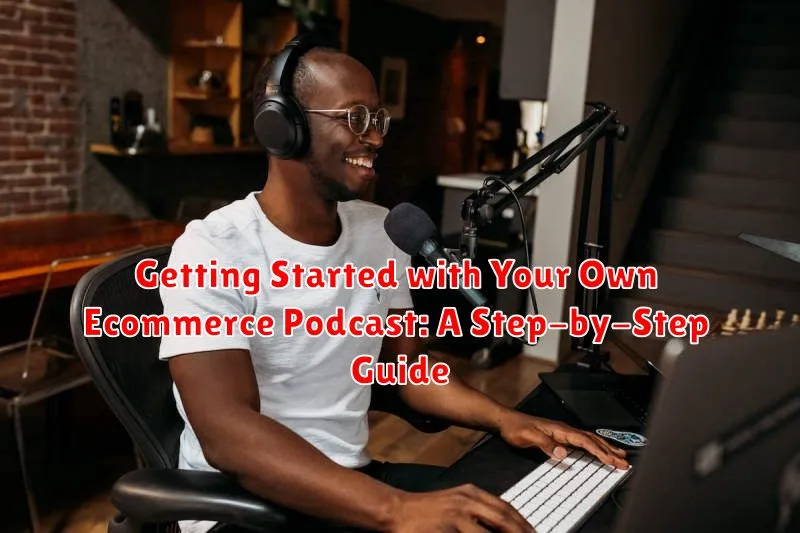
Ready to dive into the world of podcasting for your ecommerce business? It’s a fantastic way to connect with your audience, build brand awareness, and even drive sales. But where do you begin? This step-by-step guide will equip you with the essentials for launching your own successful ecommerce podcast.
1. Define Your Podcast’s Purpose and Target Audience
Before you start recording, ask yourself: What do you want to achieve with your podcast? Are you aiming to educate your customers, entertain them, or build a community around your brand? Once you have a clear purpose, identify your ideal listener. Who are you trying to reach? Understanding your target audience will help you shape your content, choose your format, and even select your podcast’s name.
2. Choose a Catchy Name and Craft a Compelling Podcast Description
Your podcast’s name is your first impression. It should be memorable, relevant to your brand, and easy to pronounce. Your podcast description is equally crucial. It should concisely summarize your show’s content and entice potential listeners to tune in. Think of it as a mini-elevator pitch for your podcast.
3. Select Your Podcast Format and Structure
Will your podcast be an interview show, a solo commentary, or a combination of formats? Consider the different types of podcasts that work well for ecommerce businesses, such as product reviews, customer success stories, industry news updates, and tips on how to use your products. Establishing a consistent format will help you maintain momentum and keep listeners engaged.
4. Invest in Quality Recording Equipment
While you can start with basic equipment, good audio quality is essential for a professional podcast. Invest in a decent microphone, headphones, and potentially a pop filter to minimize distracting noises. If you’re planning on recording interviews, a remote recording setup is also a good idea.
5. Plan and Outline Your Episodes
Don’t just wing it! Prepare an outline for each episode, covering the key topics you’ll discuss and any questions you might ask guests. This will help you stay on track and deliver a well-structured podcast experience.
6. Master the Art of Recording and Editing
Practice makes perfect. Record test episodes to get comfortable with your equipment and find your flow. Once you’ve finished recording, use editing software to remove any silences, umms, and ahs, and to adjust audio levels for a clean, polished sound.
7. Choose a Podcast Hosting Platform
Choose a platform that offers features such as episode uploading, podcast analytics, and integration with popular podcast directories like Apple Podcasts and Spotify. Some popular options include Libsyn, Buzzsprout, and Anchor.
8. Submit Your Podcast to Directories
Once you have several episodes recorded, submit your podcast to popular directories. This will make it discoverable by potential listeners searching for content like yours.
9. Promote Your Podcast
Don’t just create content and hope people find it. Promote your podcast across your website, social media channels, email lists, and even through paid advertising. Encourage listeners to subscribe, leave reviews, and share your episodes with their networks.
Launching your own ecommerce podcast can seem daunting, but by following these steps, you can lay a strong foundation for a successful audio experience that connects with your audience and boosts your business. Remember, consistency is key. Plan your content, record regularly, and engage with your listeners to build a loyal following and watch your podcast grow.
Building a Loyal Audience for Your Ecommerce Podcast
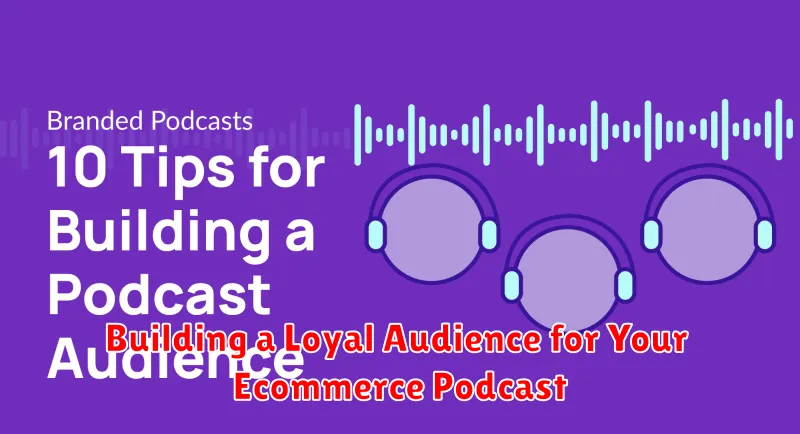
In the bustling landscape of e-commerce, standing out is crucial. Podcasts offer a powerful platform to connect with potential customers and cultivate a loyal audience. Building a dedicated listener base for your e-commerce podcast requires a strategic approach that blends engaging content with effective promotion.
Define your target audience: Before you start recording, take the time to understand your ideal listener. What are their interests, pain points, and shopping habits? This clarity will guide your content creation and ensure you resonate with the right audience.
Craft compelling content: Your podcast should offer value to your audience. Provide insightful tips, address their concerns, and entertain them. Feature guest experts in your industry to broaden your reach and offer diverse perspectives. Don’t forget to incorporate calls to action that encourage listeners to visit your website or explore your products.
Promote your podcast strategically: Once you have a few episodes in the bag, it’s time to spread the word. Share your podcast on social media platforms, embed it on your website, and consider cross-promotion with other relevant podcasts. Utilize email marketing to engage your subscribers and drive listeners to your podcast.
Engage with your listeners: Building a loyal audience goes beyond producing great content. Foster a sense of community by interacting with your listeners. Respond to comments and questions on social media, host live Q&A sessions, and consider running contests or giveaways to keep listeners engaged.
Measure and adapt: Track your podcast’s performance using analytics tools. Monitor download numbers, listener engagement, and other key metrics. Analyze this data to understand what resonates with your audience and adjust your content and promotion strategies accordingly.
By consistently creating valuable content, promoting effectively, and engaging with your listeners, you can build a loyal audience for your e-commerce podcast. This, in turn, can drive traffic to your website, boost brand awareness, and ultimately contribute to your e-commerce success.
Monetizing Your Ecommerce Podcast: Strategies and Best Practices
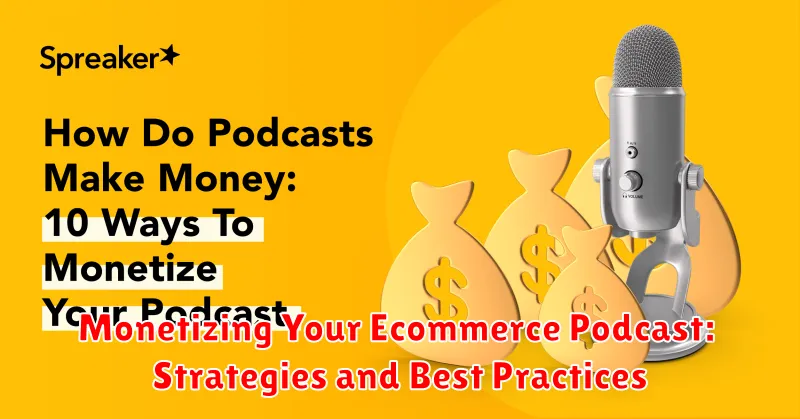
While creating valuable content for your audience is the primary goal of your ecommerce podcast, monetization strategies can help you sustain and grow your podcasting efforts. Here are some effective strategies and best practices for monetizing your ecommerce podcast:
Direct Sales & Promotions
Your podcast is a prime platform for directly promoting your products and services. Consider these tactics:
- Product Spotlights: Dedicate segments to featuring specific products, highlighting their benefits and use cases.
- Limited-Time Offers: Exclusive deals and discounts for your listeners can drive immediate sales.
- Call to Actions: Encourage listeners to visit your website, shop specific collections, or sign up for email lists.
Sponsorships & Affiliate Marketing
Partnering with relevant brands can provide a consistent revenue stream:
- Sponsored Episodes: Partner with complementary businesses to create sponsored episodes that integrate their products or services seamlessly.
- Affiliate Marketing: Promote products or services from other businesses and earn a commission on sales generated through your unique affiliate link.
- Host Read Ads: Integrate short, engaging ads into your podcast content.
Membership & Premium Content
Offer exclusive benefits to your most dedicated listeners:
- Paid Membership: Create a premium subscription tier that grants access to bonus content, early releases, and exclusive perks.
- Content Bundles: Package your podcast with complementary products or services, such as ebooks, courses, or consultations.
Best Practices for Podcast Monetization
To ensure your monetization efforts are successful and well-received by your audience:
- Transparency: Clearly disclose sponsored content and affiliate relationships to maintain trust.
- Value & Relevance: Ensure sponsored content aligns with your audience’s interests and adds value to their listening experience.
- Audience Engagement: Interact with your audience, respond to comments and feedback, and foster a sense of community.
By implementing these strategies and best practices, you can transform your ecommerce podcast into a profitable platform while continuing to deliver valuable content to your audience.
Common Mistakes to Avoid in Ecommerce Podcast Marketing
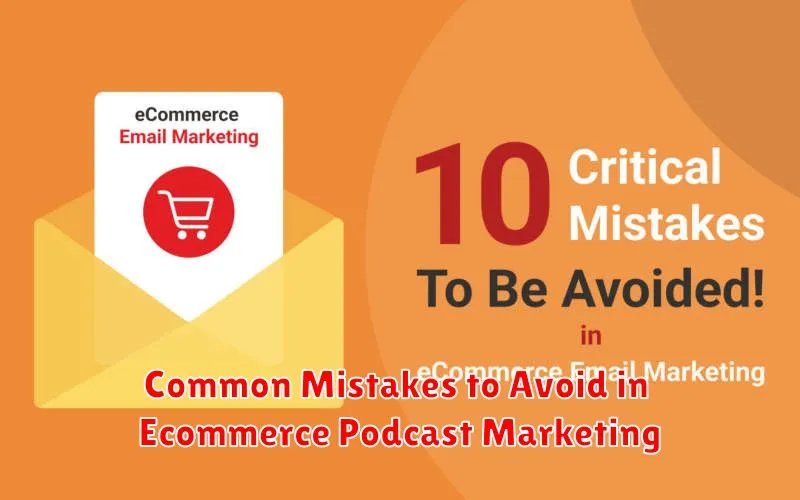
Podcasts have become a powerful tool for businesses to reach their target audience, especially in the ecommerce space. However, many marketers make common mistakes that can hinder their success. Here are some key mistakes to avoid when using podcasts for ecommerce promotion:
1. Ignoring your target audience: Just like any other marketing strategy, podcast marketing is most effective when it’s tailored to your specific audience. Don’t choose podcasts simply because they have a large following. Focus on podcasts that align with your brand and resonate with your target customers. Consider factors like demographics, interests, and listening habits.
2. Not having a clear call to action: Simply mentioning your brand or product on a podcast isn’t enough. You need to tell listeners what you want them to do next. This could involve visiting your website, signing up for your email list, or making a purchase. Include a strong call to action in your podcast advertising and make sure it’s easy for listeners to take action.
3. Focusing solely on sales: While it’s important to promote your products, remember that podcasts are about building relationships. Offer valuable content and insights to listeners. You can share industry tips, answer common questions, or offer behind-the-scenes glimpses of your company. By providing value, you’ll establish trust and credibility.
4. Failing to measure your results: It’s important to track your podcast marketing efforts to understand what’s working and what’s not. Use analytics tools to monitor downloads, listens, and conversions. This data will help you optimize your strategy for better results.
5. Ignoring the power of partnerships: Collaborating with other businesses or influencers can significantly expand your reach and audience. Partner with relevant podcasts or creators to create sponsored content, co-host episodes, or participate in cross-promotions. This can open doors to new customers and enhance brand awareness.
By avoiding these common mistakes, you can effectively leverage the power of podcast marketing to grow your ecommerce business. Remember to focus on creating valuable content, targeting the right audience, and measuring your results. Tune in to success with a well-executed podcast marketing strategy.
Tools and Resources for Streamlining Your Podcast Marketing Efforts
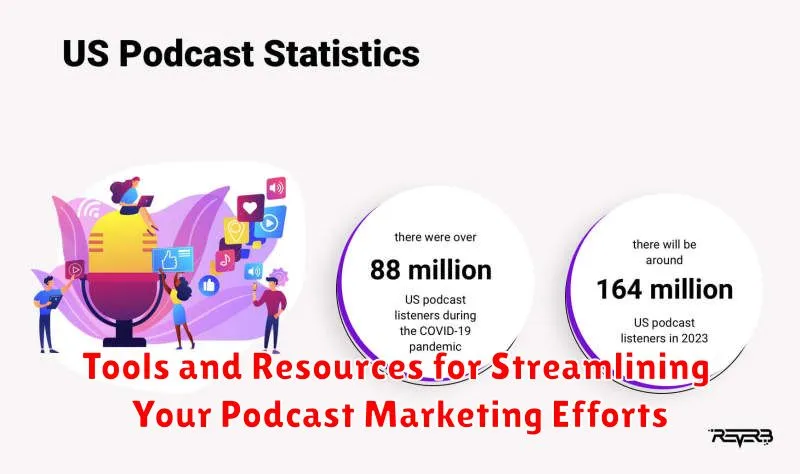
Once you’ve launched your podcast, it’s time to get the word out and attract listeners. To streamline your podcast marketing efforts, consider these tools and resources:
Podcast Hosting Platforms
Choosing the right podcast hosting platform is crucial. It should offer features like:
- Easy uploading and publishing
- Analytics and listener data
- Integration with other platforms like Spotify and Apple Podcasts
Popular options include:
- Buzzsprout: Easy to use with great analytics and a free plan.
- Libsyn: Strong features, including detailed analytics and customization options.
- Anchor: Great for beginners with its simple interface and distribution features.
Podcast Promotion and Distribution
Getting your podcast in front of potential listeners requires strategic promotion:
- Podcast directories: Submit your podcast to major directories like Apple Podcasts, Spotify, Google Podcasts, and more.
- Social media marketing: Share podcast episodes on social media platforms and engage with listeners.
- Email marketing: Build an email list and promote your podcast to your subscribers.
- Podcast cross-promotion: Collaborate with other podcasters for guest appearances and cross-promotion.
Tools for Podcast Analytics
Understanding your listener data is vital for optimizing your podcast. Utilize tools like:
- Podcast hosting platform analytics: Most platforms offer insights into downloads, listens, and listener demographics.
- Google Analytics: Track website traffic and audience behavior for your podcast website.
- Chartable: Provides in-depth analytics and helps you understand listener behavior across various platforms.
By utilizing these tools and resources, you can streamline your podcast marketing efforts, reach a wider audience, and maximize the impact of your podcast on your ecommerce business.

